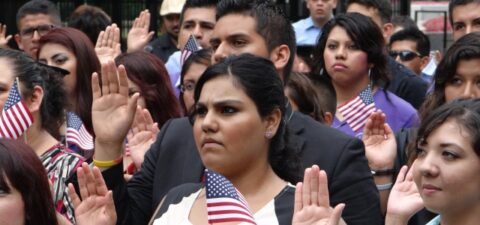Economic Impact

Taking the Important Leap to Citizenship
Each year on September 17, the United States observes Constitution Day and Citizenship Day, a combined event that commemorates the anniversary of the nation’s constitution and recognizes all those who are or have become U.S. citizens. It is considered a time for Americans to reflect on the importance of the rights and responsibilities of citizenship, as well as what it means to be a U.S. citizen. However, it’s also an important time to applaud those who have worked hard to become citizens, while exploring ways to remove barriers for those who are eligible, but still haven’t taken the leap. Read More

Women Arrested Demand Action on Immigration Reform
More than 100 women blocked an intersection outside of the House of Representatives Thursday to push for House leaders to finally act on immigration reform. Capitol Police officers arrested the 104 women, including more than 20 who are undocumented, for the act of civil disobedience. More than 200 supporters witnessed the arrests and called on the House to match the women’s courage and pass legislation that will fix the U.S. immigration system. “Each one of us here today understands what incredibly high stakes we are talking about—immigration reform is not just a piece of legislation but the ability for us to take care of our families,” said Pramila Jayapal, co-chair of We Belong Together: Women for Common-Sense Immigration Campaign, at a rally before the arrests. Read More

U.S. Must Confront Challenges of Attracting Global Innovation Talent
Across the United States, innovative industries in the science, technology, engineering, and mathematics (STEM) fields have driven economic growth and job creation nationally and in metropolitan areas throughout the country. And the human capital—the people who are leading these innovations—comes not only from homegrown talent but also from a global labor market and talent pool. The U.S. has a well-established innovation economy, similar to other developed nations. But certain challenges exist for countries to attract talent to fuel these industries. A new report from the Migration Policy Institute (MPI) describes the policy challenges related to attracting individuals from the global talent pool. The authors recognize human capital as “the one resource that can propel firms and economies to the top tier of competitiveness.” There have been undeniable increases in the supply and demand for skilled workers worldwide as more places continue to transition to knowledge-based economies with rising occupational skill requirements. As such, in addition to advances in OECD countries, the report notes that as developing countries continue to grow, and as their immigration policies “become less bureaucratic and cumbersome, a much greater choice of destinations will open up for the internationally mobile.” Read More

Why is the Obama Administration Arguing that Undocumented Immigrants Should Not Practice Law?
Today, the California Supreme Court will hear oral argument in a case that asks whether an undocumented immigrant may receive a license to practice law in California. The Committee of Bar Examiners – the entity charged with deciding who qualifies for a law license in California – supports admitting Sergio Garcia to the bar. So do some 48 organizations and 53 individuals who signed on to “friend of the court” briefs submitted to the California Supreme Court. Of the three opposing arguments filed, two came from individuals but the other came from an unexpected source: the Department of Justice. Not only did DOJ voluntarily weigh in with a hypertechnical argument that is tone deaf to the current debate over undocumented status in this country, but it took the same position in a Florida case involving a lawfully present and work-authorized recipient of Deferred Action for Childhood Arrivals (DACA), Jose Godinez-Samperio. Even if there was a good legal argument for opposing admission of an unauthorized immigrant to the bar, the rationale makes little sense in the context of an individual who is a DACA beneficiary. In both cases, however, the result DOJ seeks would lead to less socio-economic inclusion of the very immigrants the Obama administration seeks to protect. Read More

Labor Day Celebrations Should Also Pay Tribute to Immigrant Workers
Americans are observing Labor Day, which pays tribute to the many contributions and achievements of American workers. As celebrations are underway, the holiday offers an opportune moment to reflect on the very concept of American workers. In other words, who is an American worker? Where do immigrants—who contribute their talents and labor to the production of goods and services in the United States—fit into the picture? Read More

Immigrant Business Owners Continue to Contribute to Communities Across America
During the August recess, Members of Congress have been meeting with constituents in their home states and districts. During this time, many have likely dined at an immigrant-owned restaurant or used the services of an immigrant-owned business within their home state. The fact is, immigrant businesses are important in many communities across America. Immigrant entrepreneurs bring in additional revenue, create new jobs, and boost local and state economies. Indeed, immigrant entrepreneurs and innovators continue to make contributions throughout the U.S. Read More

Fight for Fairness and Justice in its Many Forms Far From Over
Wednesday marks 50 years since more than 250,000 people joined the March on Washington for Jobs and Freedom and pushed the government to extend civil and economic rights to African Americans. A massive rally where the Rev. Martin Luther King Jr. made his historic “I Have a Dream” speech on the steps of the Lincoln Memorial, it has been credited with spurring passage of the 1964 Civil Rights Act and the Voting Rights Act of 1965. Read More

ICE Policy on Parental Rights Addresses Long Overdue Problem in Immigration System
For years, leading family and children’s advocates have argued that the bond between parent and child is often a casualty of our broken immigration system. Consequently, they have argued that ensuring parental rights in the context of immigration proceedings is critical—whether the issue is about determining who should have custody of an unaccompanied minor, exercising discretion to release a sole caregiver from detention, or ensuring that a person in immigration proceedings doesn’t automatically lose parental rights. On Friday, Immigration and Customs Enforcement (ICE) finally released a memorandum that offers clear guidelines on these questions. Unfortunately, some people, like House Immigration Subcommittee Chairman Bob Goodlatte, immediately tried to turn this into a political issue about immigration reform, instead of what it is—guidance for making sure the rights of parents and children are protected. Read More

Our Immigration System Must Encourage Foreign Entrepreneurs to Invest in the U.S.
Immigrants started 33 percent of U.S. venture-backed companies between 2006 and 2012 that went public, according to a new report from the National Venture Capital Association. The report, however, also noted that there is no reliable immigration program for foreign entrepreneurs, who must surmount enormous legal difficulties in order to come here to create businesses and drive innovation and job growth. Read More

Immigrant Entrepreneurs Help Build U.S. Economy One Company at a Time
Google, Intel, eBay, Yahoo!, Facebook, LinkedIn, SanDisk, Altera, Zoosk, Etsy, Tesla Motors. What characteristic does each of these well-known companies share? They each were either founded by an immigrant or have at least one immigrant founder. Now, a new report from the National Venture Capital Association highlights the profound impacts that immigrant entrepreneurs—like the immigrants who helped to found major U.S. corporations—have on our economy. Immigrant entrepreneurs start companies throughout America in many different industries, creating value and new jobs in the United States, and advancing U.S. innovation. Read More
Make a contribution
Make a direct impact on the lives of immigrants.
